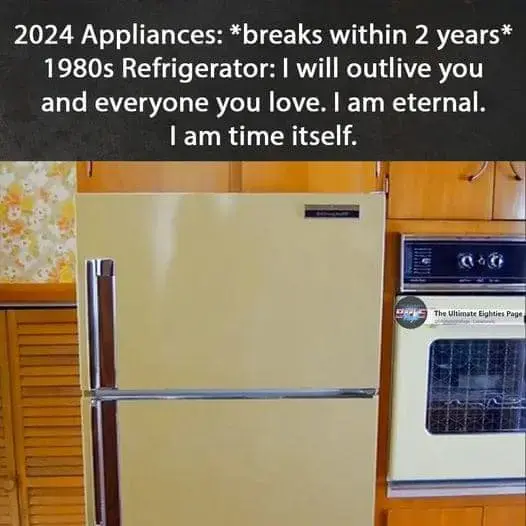this post was submitted on 19 Oct 2024
178 points (100.0% liked)
Jokes and Humor
6206 readers
11 users here now
A broad community for text and image based jokes, humor, and memes.
This community's icon was made by Aaron Schneider, under the CC-BY-NC-SA 4.0 license.
founded 1 year ago
MODERATORS
you are viewing a single comment's thread
view the rest of the comments
view the rest of the comments

So, I learned something interesting about the technology underpinning refrigerators once. In my case, it was an old HVAC AC unit.
We had it checked once, and the tech said the until was really old, but seemed fine. It turns out the old units lasted forever, because they were made with heavy duty materials - thick steel, etc. The downside was that the efficiencies were really low. He said it was a trade-off: you get higher efficiencies by using thinner metal with better thermal conductivity, but you sacrifice durability. Basically, it's a trade-off between durability and efficiency. Whatever built-in obsolescence you get is on top of an essential limitation in physics: it takes more energy to transfer heat between thick metal and thin, and thin just doesn't last as long.
I'm not a materials scientist, so I'm probably paraphrasing him wrong and misinterpreting it, but since his advice was to not replace it until it died, which could be another decade, unless I had an urgent desire to get a higher efficiency unit, I figured he wasn't BSing me and took him at his word.
I absolutely believe in planned obsolescence, but I also believe that there are some fundamental laws of physics contributing to lifespan of appliances. If you want high efficiency (in some types of appliances, such as refrigerators), you're generally going to be working with more flimsy materials which are more prone to breaking down.
I suspect that the higher efficiency don't make up for the irreparability and subsequent waste of replacing appliances more often, but Energy Star contributed to requiring some of that, so not all of the blame can be laid on manufacturers.
The pieces of refrigerators that have failed me in the last 15 years have been the plastic parts. A small improvement in plastic quality or engineering seems like it could double the life of the refrigerator. And of course a small plastic replacement part costs $50 or more.
My last fridge, something in the compressor failed; it would have cost almost as to fix as replace.
But maybe fridges aren't the same as AC units and heat exchangers. If I knew that, I could probably have fixed my fridge myself :-/